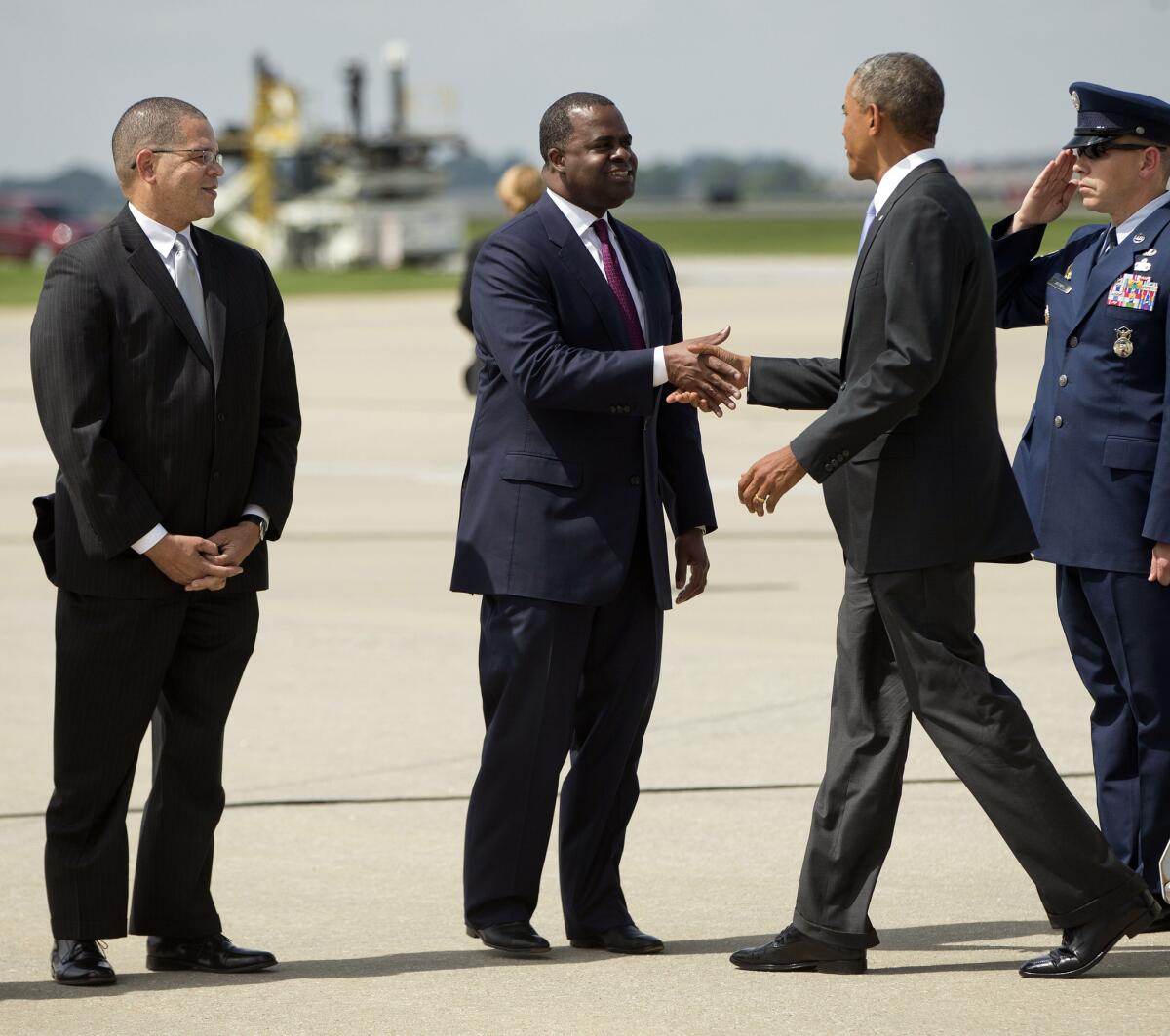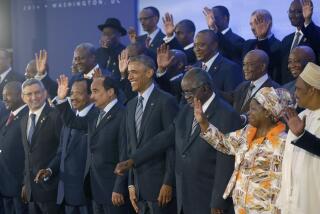Obama ramping up U.S. response in Ebola outbreak

Reporting from Atlanta — President Obama on Tuesday called the Ebola virus an epidemic unlike any the world has seen, and he pledged to ramp up the U.S. response while calling on other countries and charities to join in and act urgently.
The virus is “spreading faster and exponentially,” Obama told doctors, nurses and researchers at the Centers for Disease Control and Prevention here.
“If the outbreak is not stopped now, we could be looking at hundreds of thousands of people affected,” he said, contending that there will be serious security implications beyond the affected nations in West Africa.
With that risk in mind, Obama said he is ordering the military to set up a joint force headquarters in Liberia to coordinate international relief, help build 17 new Ebola treatment units and support medical experts flooding the region.
The effort will involve an estimated 3,000 U.S. military personnel, according to the White House, and military medical staff will begin training 500 healthcare providers a week to care for patients and prevent transmission of the virus.
The timing of the U.S. response, months after the outbreak started and well after it raged across West Africa, puts pressure on the administration to act on its pledge as soon as possible, experts warned.
Laurie Garrett, a global health and infectious diseases expert at the Council on Foreign Relations, expressed cautious optimism about Obama’s plan. She called it a “game-changing start” that could rally other international partners to increase their involvement. But she worried it could take weeks for the resources to be in place, and longer to train and organize the needed brigade of healthcare workers from around the world.
“Right now, the virus is in charge. It’s spreading far faster than any reaction from international players,” she said. “To get ahead of the virus, we need to have a massive presence on the ground yesterday.”
Noting that the U.S. has spent more than $100 million on equipment, logistics and support for community health workers in the region, advisors to the president contended that his timing is appropriate.
The new assistance comes as the need grows, White House Press Secretary Josh Earnest insisted.
“The CDC has responded aggressively to the situation since the initial reports of an Ebola outbreak became public back in March, so this has been a sustained effort that has been underway for some time,” he said.
White House officials acknowledged they don’t know how long it will take to get the treatment facilities running, nor how long the 3,000 military personnel will remain in West Africa.
Most cases of Ebola are in Liberia, Sierra Leone and Guinea, where the outbreak was first reported in March. As of Saturday, nearly 5,000 Ebola cases were reported in the region, although many had not yet been confirmed through laboratory testing, the World Health Organization said Tuesday. Almost half of those believed infected have died.
The outbreak could take nearly $1 billion to bring under control, the WHO said, double what the organization estimated last month when it outlined a strategy to respond to the epidemic.
The Pentagon plans to ask Congress for $500 million to fight Ebola, an administration official said. That’s in addition to an earlier $500-million request both for the Ebola outbreak and to take on militant forces in Iraq.
Obama talked about the need for quick action now.
“The world still has an opportunity to save countless lives,” he said, while acknowledging the problem will get worse before it gets better.
“The world has a responsibility to act, to step up and do more,” he said, and Ebola demands “a truly global response.”
His stop at the CDC was part of a 24-hour tour designed to burnish his image as commander in chief at a time when he is trying to sell a more aggressive foreign policy to the American public and members of Congress. He framed the Ebola outbreak as a security issue rather than a public health crisis.
“It’s a potential threat to global security,” he said. “If these countries break down, that has profound effects on all of us.”
Many in the global health community welcomed the announcement.
“This massive ramp-up of support from the United States is precisely the kind of transformational change we need to get a grip on the outbreak and begin to turn it around,” said Margaret Chan, director-general of the WHO.
Still, had Obama ordered this action months ago, it might have resolved the crisis by now, Garrett said.
“Unfortunately,” she said, “that was not the case, and so we have an absolute catastrophe on our hands.”
Garrett did praise Obama for describing what she called the appropriate justification for his decision. He cited the threat of many deaths and destabilization in West Africa. In the past, she’s been disappointed by what she called an overemphasis on the threat the virus could pose to Americans.
Parsons reported from Atlanta and Hennessey from Washington. Times staff writer Alexandra Zavis in Los Angeles contributed to this report.
For more White House coverage, follow @cparsons.
More to Read
Sign up for Essential California
The most important California stories and recommendations in your inbox every morning.
You may occasionally receive promotional content from the Los Angeles Times.












